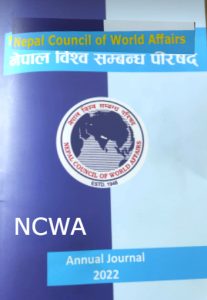Yuba Raj Adhikari
Nepal Council of World Affairs ( NCWA)
Kathmandu, Nepal
Abstract:
The fate of any country depends on its geopolitical situation and its role in world politics. At any given time, a small and less powerful country’s independence can be threatened by geopolitical uncertainties and big power politics. Big powers are interested in the natural resources of their neighbors. They are also concerned about their national security and hence try to expand their influence in the neighboring countries. Nepal is located in a crucial geostrategic position between big and powerful neighbors India and China. Nepal’s longstanding foreign policy of non-alignment is key to maintaining its sovereignty and independence in today’s complex geopolitical environment. This article analyzes the importance of Nepal’s geo-strategic position and the means to get benefits out of it. Keywords: geo-strategic, connectivity, foreign policy, border, security.
Introduction:
Nepal is one of the landlocked countries in the world. Nepal is surrounded in the East, West and South borders by India and the northern borders are surrounded by Tibet, the autonomous region of China. Nepal does not have direct access to the sea. It has to depend on India and China for sea access. Despite not having access to the sea Nepal has been becoming a center of strategic attraction for many of the world’s most powerful countries in terms of geopolitics. Nepal has been maintaining balanced relations between India and China, and other emerging countries of the world, for its economic benefit. Nepal is connected by Himalayas, rivers and strategic borders and road network with India and China. It has been strategically influenced by the two neighboring countries China and India. Nepal’s political and economic stability is important for China and India. Therefore, we should use Nepal strategically for the geopolitical balance in South Asia.
Regional Power Balance:
Although there is still a border dispute with India, which became independent in 1947, Nepal-India relations have been friendly. The unannounced embargo imposed by India for two months in 2015 is clear sign that India wants its presence in Nepal. Considering India’s behavior and repeated blockades in Nepal, the country need to be self reliant. South Asian countries including Nepal, Pakistan, Bhutan, Bangladesh, Sri Lanka and Afghanistan based on geography and population have to adopt restraint and mutual relations with neighbors. Due to the geography of the country, Nepal can become a buffer zone for international powers. Therefore, regional balance of power is important for Nepal’s interest.

Internal Stability:
Geopolitical activities by international powers can lead to internal instability in the nation. For that, political parties and leaders need foresight for the sake of nation. The short-sighted approach of political parties and leaders can harm democracy. The country was plunged into an armed conflict due to mishandling of situation by the concerned political parties. It is only natural that conflicts in the country affected the people a comprehensive peace agreement was signed between the Government of Nepal and the Maoists in 2004 with the active facilitation of India. Since then, Nepal has been moving forward through a process of peaceful transition. Nepal, located between two-thirds of the world’s population and economically prosperous China and India needs to take advantage from their technological know-how.
Nepal has to strictly implement its non aligned foreign policy for maintaining good relationship with all.
Influencing Factors in Foreign Policy of Nepal:
Geographical reality is a foreign policy determinant that cannot be changed Nepal’s geostrategic position has had an impact on its international relations. Foreign policy depends on the country’s population, region, national resources, natural resources and military capabilities. Nepal is a small country by the standards of developed countries. The leaders and people of small countries do not succeed in playing a greater role in the international game. Therefore, due to the small size of Nepal’s economy and population compared to India and China, Nepal has lesser involvement in international affairs. So, we cannot express our views clearly which is affecting the foreign policy. In such a situation, adopting a appropriate foreign policy is a big challenge for Nepal.
Nepal’s Role in Regional Geopolitics:
Nepal is bounded by a perimeter of 3222.88 km; of which 1808 km length falls along India’s Uttar Pradesh, Bengal and Bihar. Nepal’s border with China is about 1414.88 km (Shrestha, 2003). Therefore, the stability of these areas depends to some extent on Nepal’s security, so India always strives to secure its rights in Nepal. Realizing this importance, India signed the Peace and Friendship Treaty in 1950. Similarly, China wants stability in Nepal too. The West countries are looking to enter Nepal to bring emerging China and India to size, in the words of author Bhim Bhurtel:
Nepal has not seen either China or India as a threat to its “territorial integrity” and “sovereignty,” although Nepal has accused India of unfair treatment since 2015 and it tends to turn to China when it is in dire need of support. The politi cal and foreign-policy elites of Kathmandu also know only too well that the US tends to follow India’s policy lead when it comes to dealings with Nepal. Besides that, all Nepalese political parties, including the pro-Indian fringe Madhesi parties, firmly believe in the “one China” policy. (Bhurtel, 2018)
India does not want Nepal to get out of its sphere of influences. Therefore, India has always wanted Nepal to move according to its own interest. In his article, Jagat S Mehta, an Indian writer, has said:
It is acceptable for Nehru to be cautious and restrict contact with the outside world to a minimum. Nehru who encouraged Nepal’s participation in Bandung (1955) at the first Asian Relations Conference, sponsored it for membership of the United Nations and eventually gave consent for the establishment of other resident embassies in Kathmandu, which British India, even while accepting Nepal’s independence, had steadfastly resisted (Mehta, 2004).
This example shows a contrast in the relationship between Nepal and India. The geo political reality is not changeable. Nepal needs to pursue an independent policy. Nepal cannot allow anti-Indian activities and anti China activities in our territory. Nepal’s geo political reality non-alignment policy and geographical location have played a major role as foundations of its foreign policy.
Strategic Capability of Nepal:
Nepal has been contributing to the United Nations peacekeeping mission for more than 50 years, that has enhanced its global image in spite of weak its economic and military strength than powerful countries. In the backdrop of a weak economy and political in stability, Nepal cannot build effective relations with its neighbors. Due to the lack of a strong military and economic sector in Nepal, there has always been a fear of domination from powerful neighbors. As a member of the UN, Nepal wants peace and does not want to go to war with any country. That is why Nepal became a founding member of the Non-Aligned Movement, established in 1960. Nepal prohibits the production and use of any type of nuclear and biological weapons within its territory. The radioactivity emanating from the biological weapons factories of the nuclear-armed nations poses a threat to Nepal’s security.
Dr. Kamal Krishna Shrestha writes:
Global Threat Reduction Initiative (GTRI) of the US supports permanent threat reduction by eliminating nuclear weapons-usable excess stockpiles located at civilian sites. GTRI is cooperating with more than 90 countries. IAEA provides worldwide technical and other assistance to enhance physical protection of radioactive sources used for oncology, industrial use, medical sterilization, food preservation, etc as well as research work. In addition, the US is collecting and transporting up to a safe depositary to deny radioactive and nuclear materials to the terrorist. Global threat reduction program of UK, Department of Energy and Climate Change, is on the other hand contributing towards creating awareness of the importance of nuclear security and conducting training activities in collaboration with IAEA and the US, EU, Soviet Union and many concerned countries including Nepal. (Shrestha K. K., 2020)
In today’s changing world, the topmost power is strategic, the second is economic and the third is ideological. If the non-aligned policy is universally accepted by the global powers, this policy of Nepal can become its strategic capability.
Conclusion:
Nepal does not compromise with sovereignty and does not allow its land to be used for any activities against neighboring and other countries. Nepal should not be identified as a buffer state. However, it cannot ignore the influence of its neighbors. Nepal is in between vast neighboring countries. While analyzing the national security policies of India, China and the United States, they have a direct geopolitical, strategic and security interest in Nepal. In the current situation, a triangular rivalry could undermine Nepal’s national interest in the future. Therefore, it is important to understand the reality of the long-term impact on Nepal due to the growing game of geopolitical power between them. It is also important for Nepal to study the policies, strategies and diplomacy of the world powers and to make an objective analysis without being provoked or opposed by anyone. Nepal must protect and promote its national interest while respecting its fundamental strategic interests. If Nepal can maintain diplomatic and strategic balance between the world powers, it can avoid geopolitical games.
End text.
Thanks the author Shri Yuba Raj Adhikari Nepal Council of Affairs Journal, 2022.: Ed. Upadhyaya.
References:
Bhattarai, U.K. (2016). Geopolitical Dimension of Nepal and Its Impact in South Asia.
Journal of International Affairs Vol. 1, No. 1.
Bhurtel, B. (2018). US tries in vain to pull Nepal into its orbit. Asia Times: Hong Kong.
Dahal, R.K. (2009). Emerging role of Nepalese diplomacy in regional and global poli
tics. The Weekly Mirror: Kathmandu.
Mehta, J.S. (2004). India and Nepal Relations: A Victim of Politics, in India Nepal Rela
tions: The Challenge Ahead, ed. Rupa. New Delhi: Rupa.pg 26.
Mehata, J. S. (2015). The Tryst Betrayed: Reflections on Diplomacy and Development.
India: Penguin. Ojha, H. (2015). The India-Nepal Crisis. The diplomat. Diplomat Media Inc: Arlington,
VA, USA.
Paul, N. and Eric, W. (2018). Who runs the international system? Nationality and lead B ership in the United Nations Secretariat. Open access: Springer link.
Shrestha, B.N. (2003). Border Management of Nepal, Kathmandu: Bhumichitra Co. P.
Ltd.
Shreshta, K.K. (2020). Nuclear Security in Nepal. Kathmandu: Nepal Council of World Affairs Journal.
# Mr. Adhikari is an Administrative Officer of NCWA: Ed. Upadhyaya.
# Our contact email address is: editor.telegraphnepal@gmail.com

